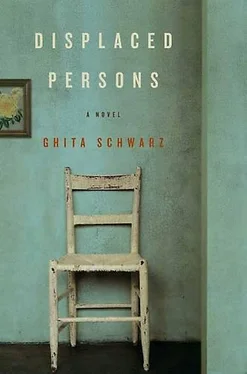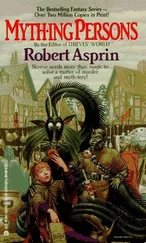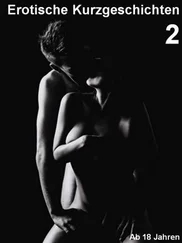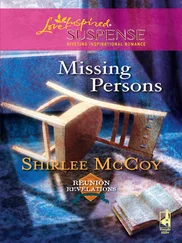Because that’s the story, explained Pavel, fingers tapping the kitchen table. The story is she looked, and became salt.
It is not right. Chaim looked at Pavel’s puzzled eyes.
She disobeyed! said Pavel. God said not to look back!
Chaim turned his gaze to his reading, the worn gray pages. The books the charities sent from America were in poor condition, the bindings unraveled, the paper thick, sometimes crumbling. Pavel, returned from his travel to the American zone without having found his sister, had brought back to Celle a satchel of books.
It’s not for us to argue with the story! It is a portion, it is important, a lesson.
I don’t understand the lesson.
She wasn’t lucky, but also she disobeyed. She risked and she lost. But the important thing is that she looked and became salt. The others, the husband and the daughters, they obeyed and they escaped.
Chaim rubbed his fingers on the sides of his face, feeling his skin. Smooth, mostly hairless, soft. There was a darkness inside him, a well of mud and dirt, but he kept himself clean with the milled white soap Pavel brought for Fela.
Enough for today, Pan Pavel?
Yes, said Pavel, suddenly absent. Yes, all right. And stop this Pan, Pan. I’m not old enough for Pan.
You’re the elder of the house.
I am thirty, said Pavel.
PERHAPS SHE HAD TURNED and looked back with a purpose. Like a suicide. Chaim had known cases himself. In the ghetto, a man had jumped from a window in a nearby apartment. Such things were reported more than a few times. There had been talk of poisonings, here and there. People who could not bear to look into a future without the home they had always known, the neighbors and the families, school, work, gardens. People who could not bear to look only forward and so looked back. To look back was to turn into a tall mound of nothing but grief, dry grief. Not a punishment but a natural consequence. She turned into salt because those who looked back turned into salt. Not a punishment. A fact.
HE CONTINUED TO ATTEND an English class. Useful to know, even if America was not a possibility for him. Adults as well as the younger ones sat nodding and repeating after the teacher, a well-educated, large-eyed girl from the south of Germany, a tall one with soft, chocolate-colored hair and a crippled hand. She wanted to go to America too, Chaim had heard, but would not be let in because of the hand, rumored to have been mutilated in camp experiments. Chaim loved the way her words sounded, long and flowing, slow, not clipped and fast like the words of the English soldiers.
Her friend came into the class every few days. Her lover? The students, young and old both, wondered aloud. He was a bit older than she, and also very cultured, a music teacher from Vienna. He would listen to her from the back until she ended the class. She would fold her papers into her satchel and walk slowly, elegantly, to greet him at the doorway. On days the friend came in, Chaim would put his notebooks in his own satchel with care, to prolong the time he could watch Tina and Leo greeting each other. Leo would take Tina’s crippled hand in his every time, and she would pull her hand away from him every time. Then he would place his hands in his pockets, and she would slip her arm through his elbow, her withered fingers hanging downward.
One day Leo came in earlier, in the middle of class. Tina looked up. He was accompanied by a child, a plump and surly little girl, perhaps ten years old.
“My friends,” said Leo, in English, “we have a performance to give.” The students looked up at him, uncomprehending.
They haven’t learned those words in English, Leo. Tina addressed the group in German. A little concert, she said. Almost. An English song?
American, said Leo.
The girl moved in front of Tina’s desk. She peered out from a hood of dark eyebrows at the gray teenagers and thin adults sitting at the long tables and began to sing.
“Heaven, I’m in heaven.” Her voice was clear and confident, her sound oddly deep, almost a woman’s. She took a breath, “And my ha-ht beats so that I can ha-ha speak.”
Leo! said Tina.
Sssh! Don’t distract her! whispered Leo in German.
But the girl had lost track of the words. Still she continued to sing the melody: “Dee dee dee dee da da da da dee dee da da”-her voice climbing, but steady, then another quick breath, during which Chaim thought he could hear someone giggling-“Dee dee da together da da cheek to cheek.”
The words came back, or at least they were sounds divisible like words, Chaim couldn’t be sure. She went through another verse, steadier, unsmiling, her voice controlled, a strange confidence for so small a child, a confidence no doubt instilled by the approval, the genuine seriousness, with which her teacher Leo treated her. Even Tina, her embarrassment somewhat quelled, looked at her with interest.
The child finished.
Bravo, said an adult in the back of the room.
Bravo, agreed Chaim. A few of the students began to clap. The little girl’s mouth moved upward for a moment, a grimace of acknowledgment, not quite a smile. Then she turned away to stand by the door.
You are terrible, Leo, muttered Tina. Terrible! Silly! In front of my students!
But she was laughing a little. Leo thrust his chin forward and bowed to the class.
“Thank you, my friends,” he said, “for your attention.”
Someone clapped again.
He continued in German, Basia and I will take our leave and let you continue with your very serious teacher.
But Leo too was serious. He may have been playing, flirting with Tina, but also he wanted the class to be impressed with a talented child. And Chaim was impressed, not just by the little girl’s nerve but also by the admiration she elicited. Chaim observed Tina’s pale lips as she tried to bring the class back to its regular lesson, the past tenses of come and go , have and be. He didn’t have all the words of the song divided out in his head, but he thought he understood the main theme of it, a man who felt himself in paradise with his lover. It was a lovely idea, that touching another person, another human, was what it felt to be in the presence of God. He liked the thought, and as he watched Tina, her face straight and calm, a mask, he thought that she too must like it. They had something in common.
TINA, TINA, TINA, SAID PAVEL.
Chaim felt his face grow hot.
Why don’t you ask this Tina? continued Pavel. Let your teachers come, let them see what we have taught you.
TINA BROUGHT LEO. IN the Roundhouse, the domed building of the camp where the committee of Jews met, the room used as a chapel held a real crowd, linked, uneven, jagged. People binding themselves to one another, humming to themselves, groaning through the memorial prayer. Chaim looked out at Pavel. Pavel looked solemn, a hard line on his face to mark the seriousness of the occasion. And on the other side of the aisle, there was Fela in a dress of dark red, and Rayzele, who had helped carry the food to the Roundhouse that morning. A wind of bitterness swept though Chaim-these were strangers, all of them, even Rayzele, with her newly fierce gaze, strangers performing rituals his father had neglected and his grandparents had wept over. He wanted to paint over the images in the crowd with pictures of his loved ones, but his imagination was stubborn, refused to do its work, took in only the haggard young faces of the living congregants, the pale smile of Fela, barley waves of hair framing her slim eyebrows, the long chin of Pavel, jutting with ownership and pride.
He began his portion.
BUT WHAT BURNED MOST brightly in Chaim was after, when Leo spoke about him to Pavel.
Such a lovely voice your Chaim has, said Leo. Very musical.
Читать дальше











